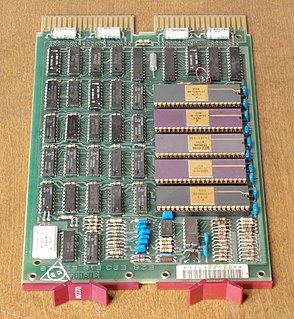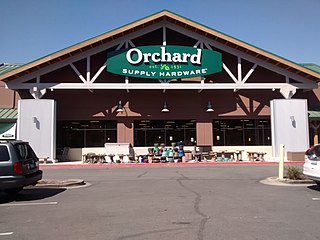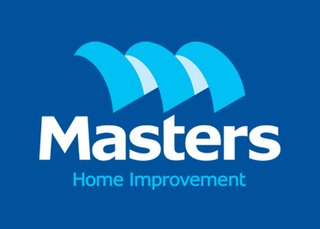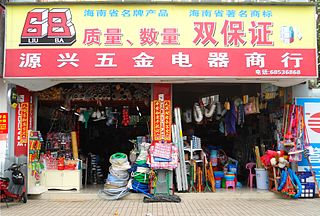
A computer program is a collection of instructions that performs a specific task when executed by a computer. A computer requires programs to function.
The control unit (CU) is a component of a computer's central processing unit (CPU) that directs the operation of the processor. It tells the computer's memory, arithmetic and logic unit and input and output devices how to respond to the instructions that have been sent to the processor.
In computing, a context switch is the process of storing the state of a process or of a thread, so that it can be restored and execution resumed from the same point later. This allows multiple processes to share a single CPU, and is an essential feature of a multitasking operating system.
Microcode is a computer hardware technique that imposes an interpreter between the CPU hardware and the programmer-visible instruction set architecture of the computer. As such, the microcode is a layer of hardware-level instructions that implement higher-level machine code instructions or internal state machine sequencing in many digital processing elements. Microcode is used in general-purpose central processing units, although in current desktop CPUs it is only a fallback path for cases that the faster hardwired control unit cannot handle.
Program, programme, or programming may refer to:
Sears, Roebuck and Company, colloquially known as Sears, is an American chain of department stores founded by Richard Warren Sears and Alvah Curtis Roebuck in 1893, reincorporated by Richard Sears and new partner Julius Rosenwald in 1906. Formerly based at the Sears Tower in Chicago and currently headquartered in Hoffman Estates, Illinois, the operation began as a mail ordering catalog company and began opening retail locations in 1925. The first location was in Evansville, Indiana. In 2005, the company was bought by the management of the American big box chain Kmart, which formed Sears Holdings upon completion of the merger.
The True Value Company is an American wholesaler with over 4,000 independent retail locations worldwide.
In digital electronics, especially computing, hardware registers are circuits typically composed of flip flops, often with many characteristics similar to memory, such as:

Lowe's Companies, Inc., doing business as Lowe's, is an American retail company specializing in home improvement. Headquartered in Mooresville, North Carolina the company operates a chain of retail stores in the United States, Canada, and Mexico. As of February 2018, Lowe's and its related businesses operate more than 2,390 home improvement and hardware stores and employ over 310,000 people in North America.

Bunnings Group, trading as Bunnings Warehouse, is an Australian household hardware chain. The chain has been owned by Wesfarmers since 1994, and has stores in Australia and New Zealand.
In computer science, a data buffer is a region of a physical memory storage used to temporarily store data while it is being moved from one place to another. Typically, the data is stored in a buffer as it is retrieved from an input device or just before it is sent to an output device. However, a buffer may be used when moving data between processes within a computer. This is comparable to buffers in telecommunication. Buffers can be implemented in a fixed memory location in hardware—or by using a virtual data buffer in software, pointing at a location in the physical memory. In all cases, the data stored in a data buffer are stored on a physical storage medium. A majority of buffers are implemented in software, which typically use the faster RAM to store temporary data, due to the much faster access time compared with hard disk drives. Buffers are typically used when there is a difference between the rate at which data is received and the rate at which it can be processed, or in the case that these rates are variable, for example in a printer spooler or in online video streaming.
Felpausch was a grocery store chain based in Hastings, Michigan, United States. The first store opened in Hastings in 1933, and the chain operated primarily in the southwestern quadrant of Michigan's Lower Peninsula. Its locations were largely sold to Spartan Stores, who converted them to Family Fare and D&W Fresh Market.
The Windows System Assessment Tool (WinSAT) is a module of Microsoft Windows Vista, Windows 7, Windows 8 and Windows 10 that is available in the Control Panel under Performance Information and Tools. It measures various performance characteristics and capabilities of the hardware it is running on and reports them as a Windows Experience Index (WEI) score. The WEI includes five subscores: processor, memory, 2D graphics, 3D graphics, and disk; the basescore is equal to the lowest of the subscores and is not an average of the subscores. WinSAT reports WEI scores on a scale from 1.0 to 5.9 for Windows Vista, 7.9 for Windows 7, and 9.9 for Windows 8 and Windows 10.

Niemann Foods, Inc. (NFI) is a company headquartered in Quincy, Illinois, that owns and operates over 100 supermarkets, convenience, pet and hardware stores mostly under the County Market, County Market Express, Harvest Market, Haymakers, ACE Hardware, Pet Supplies Plus, Pick-A-Dilly and Save-A-Lot banners in Illinois, Indiana, Iowa, and Missouri. The regional grocery store operator is growing and expanding market share in the Central Illinois, Indiana and Missouri. The employee-owned, family-run company was founded in 1917 by brothers Ferd and Steve Niemann and is currently headed by Rich Niemann, Jr.

Computer hardware includes the physical, tangible parts or components of a computer, such as the cabinet, central processing unit, monitor, keyboard, computer data storage, graphics card, sound card, speakers and motherboard. By contrast, software is instructions that can be stored and run by hardware. Hardware is so-termed because it is "hard" or rigid with respect to changes or modifications; whereas software is "soft" because it is easy to update or change. Intermediate between software and hardware is "firmware", which is software that is strongly coupled to the particular hardware of a computer system and thus the most difficult to change but also among the most stable with respect to consistency of interface. The progression from levels of "hardness" to "softness" in computer systems parallels a progression of layers of abstraction in computing.

Orchard Supply Hardware (OSH) was an American retailer of home improvement and gardening products. Headquarters were in San Jose, California, Orchard Supply Hardware had dozens of locations throughout California, with expansions into Oregon and Florida.

Metcash is an Australian conglomerate company distributing and marketing groceries, fresh produce, alcoholic beverages, hardware, and other consumer goods. Notable retailers the company owns include IGA, Mitre 10 and Home Timber & Hardware.

Masters Home Improvement was an Australian home improvement chain operated by retailer Woolworths Limited. It was established as a way for Woolworths Limited to enter the hardware retail market, which has been historically dominated by Bunnings Warehouse, owned by rival Wesfarmers. The two companies also compete with each other with groceries, liquor, fuel and general merchandise.










